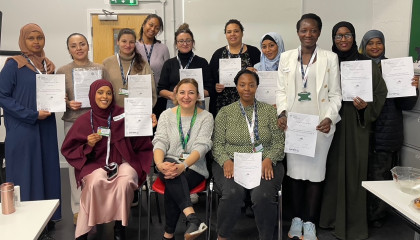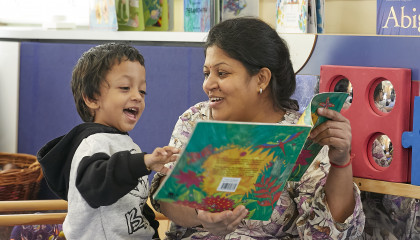You are here: Childcare - a crucial issue in May's elections
On 5 May, adults in most parts of the UK will have the chance to vote in elections for the Scottish Parliament, the Welsh and Northern Ireland Assemblies, the Greater London Authority (Mayor and Assembly) and for council seats in many local authorities in England. There is a lot at stake, as the results will have an impact all over the UK. The results of the elections will shape the future of services such as education, public health and housing.
Our contact with parents shows that childcare is high on their list of issues they want to raise with election candidates. We have recently spoken with parents in Scotland who cannot find free early education for their children. In Northern Ireland, parents are worried that there are no plans to extend the hours of free early education their children will receive (In England and Scotland, three and four year olds will see their hours of free early education doubled). To help parents raise childcare with election candidates, the Family and Childcare Trust has produced factsheets, covering Scotland, Wales, Northern Ireland and London, as well as one for the English local elections. We are also launching some Westminster parliamentary constituency profiles, giving more information about the price, availability and uptake of childcare in individual constituencies. We hope these documents can be used to raise childcare as a crucial issue and your constituency will find this useful in their campaigns.
As our pre-election research evidences, there are three issues that seem common in the UK as a whole. First, childcare provision in the UK is expensive. Although the government has increased its level of support to families during the last years, our 2016 Childcare Survey shows that the cost of childcare has risen substantially since 2011 and many families cannot afford it. As an illustration, a family with two children aged two and five in Scotland, using a part-time nursery place and after-school club would pay £7,801 every year for childcare, which represents more than the average mortgage.
A second problem is gaps in provision. There are chronic gaps in childcare, such as free early education places, care for disabled children and after-school clubs. Shortages of childcare are even more acute in Northern Ireland and Scotland. There is no legislation or regulations to make sure there is enough childcare in Northern Ireland. This contrasts with England and Wales, where the Childcare Act 2006 obliges local authorities to make sure there is sufficient childcare for working parents and those undertaking work-related training.
A third problem in many parts of the UK is a lack of flexibility in free early education. Most three and four year olds, wherever they live, receive their free early education in school-based nurseries, usually in blocks of 2.5 or 3 hours over the five weekdays during term-time. This can create difficulties for working parents, who usually need care over the full day. In areas where there are shortages of places in more flexible private and voluntary sector nurseries, the children of working parents may be unable to take up free early education.
There are also problems that manifest themselves in particular areas. In parts of London, there is very low take-up of free early education, with more than one in ten three year olds missing out in 26 of its local authorities. Our parliamentary profiles give more details about local problems.
Childcare provision is a challenge for central Government and local authorities. The upcoming elections represent an opportunity to discuss provision. We want families to use our factsheets to make the case for childcare that meets the needs of both parents and children.
Childcare factsheets
England
Northern Ireland
London
Scotland
Wales
Constituency profiles
England
Scotland
Wales
More from our blog
Sign up to our newsletter
Get the latest news, research and resources from the Family and Childcare Trust.




